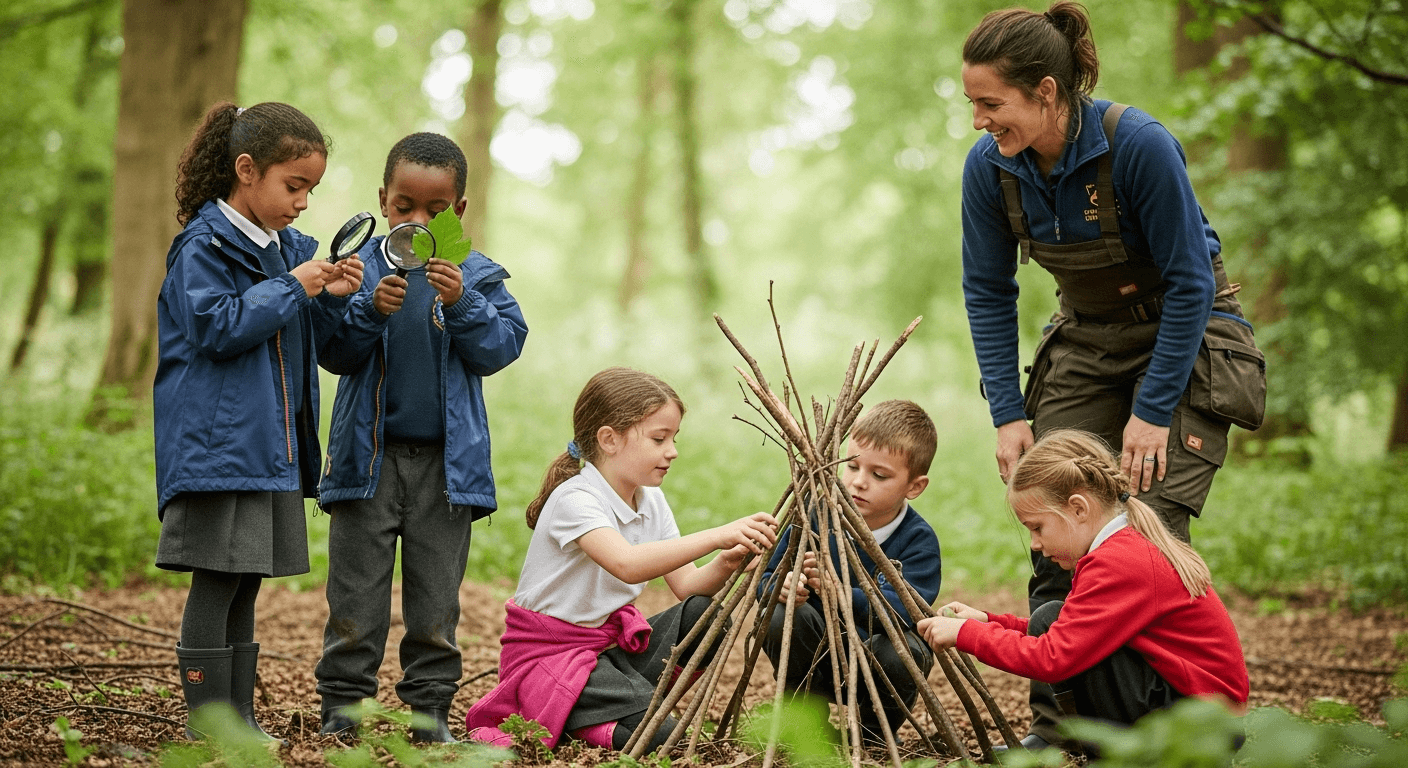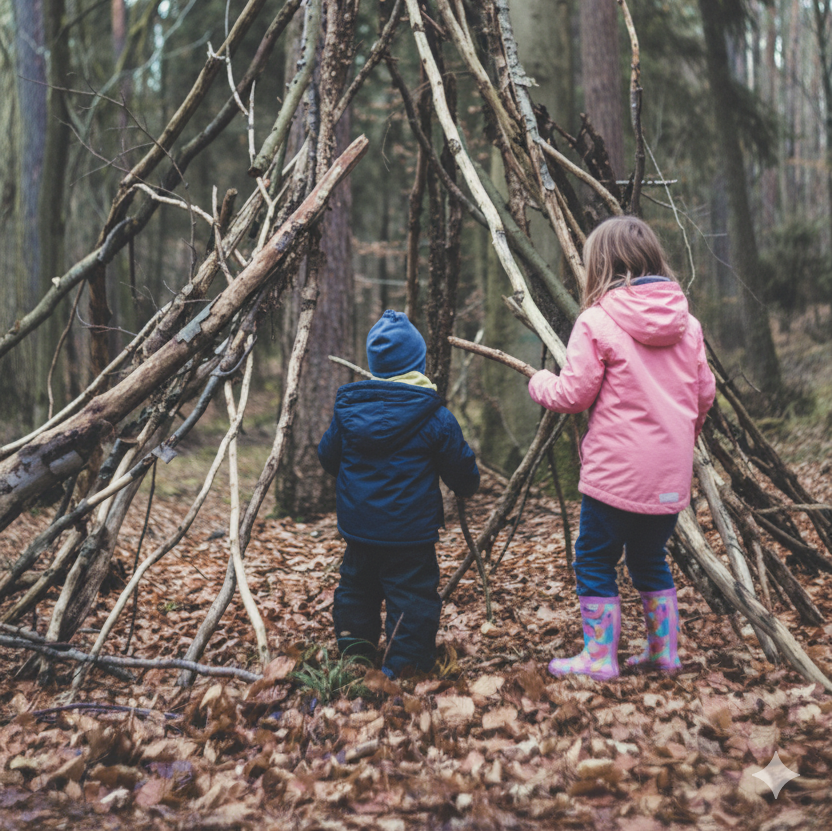· Parenting Guides · 5 min read
Forest School: A Parent's Guide to Countering Screen Time
Concerned about your child's screen time? This guide explains how Forest School offers a practical, effective antidote. Discover how this outdoor learning approach boosts physical health, improves mental wellbeing, and develops crucial social skills, providing a vital balance to the digital world.

In an age where digital devices are a part of everyday life, many parents and educators are concerned about the impact of excessive screen time on children. Forest School presents a practical and effective way to counterbalance the digital world, re-grounding children in a natural environment that fosters holistic development.
The Screen Time Dilemma: Understanding the Impact
Excessive screen time is not just about the hours spent on a device; it’s about the developmental opportunities that are missed. While technology has its place, a dependency on screens can affect a child’s growth in several key areas.
How Screen Time Can Affect Development
- Reduced Physical Activity: Time spent on tablets, phones, or game consoles is typically sedentary. This contributes to a less active lifestyle and can affect the development of crucial gross motor skills like balance, coordination, and strength.
- Disrupted Sleep Patterns: The blue light emitted from screens is known to interfere with the body’s production of melatonin, the sleep hormone. This can lead to difficulty falling asleep and result in poorer quality, less restorative rest.
- Shorter Attention Spans: The fast-paced, instant-gratification nature of many apps and videos makes it harder for children to engage in activities requiring sustained focus and patience, from reading a book to completing a puzzle.
- Limited Real-World Social Skills: While online interactions have a social element, they lack the nuance of face-to-face communication. This can hinder the development of empathy, negotiation skills, and the ability to read non-verbal cues.
What is Forest School? A Practical Overview
Forest School is more than just outdoor play; it is a specialised, long-term educational approach that takes place in a natural setting. Led by trained practitioners, it follows a child-led philosophy, where children’s own interests and curiosity guide the learning process.
The core of the experience is built on regular, repeated sessions that allow children to build confidence and form a meaningful relationship with the environment. Activities are hands-on and designed to foster resilience and a deep appreciation for nature. This can include anything from building shelters and identifying plants to using tools safely under supervision and cooking on a campfire.
How Forest School Directly Counteracts Screen Time
Forest School provides a direct, tangible antidote to the common pitfalls of a screen-heavy childhood. It replaces the passive consumption of digital content with active, physical, and mental engagement.
Fosters Real-World Connection and Social Skills
Instead of interacting through a screen, children at Forest School must communicate directly to achieve shared goals. They learn to negotiate, collaborate on building a den, listen to each other’s ideas, and solve problems as a team, developing vital social and emotional intelligence.
Enhances Physical Health and Motor Skills
Nature provides a complex and challenging environment that encourages movement. Children are constantly running, climbing, balancing, and carrying objects, which builds core strength, coordination, and stamina. Fine motor skills are also developed through intricate tasks like tying knots or handling natural objects.
Improves Mental Wellbeing and Resilience
Spending time in nature is proven to reduce stress. One study found that even a one-hour walk in a natural environment can decrease activity in brain regions involved in stress processing. Forest School harnesses this benefit, allowing children to take manageable risks in a supportive setting, which builds self-esteem and resilience. Overcoming a real-world challenge creates a powerful sense of accomplishment that digital rewards cannot replicate.
Boosts Concentration and Cognitive Function
The natural world is full of multi-sensory stimuli that engage a child’s brain in a gentle, restorative way. Unlike the potential overstimulation of a screen, the forest environment encourages curiosity and sustained focus, helping to lengthen attention spans over time.
Making Forest School Work for Your Family
Integrating this approach into your child’s life is straightforward. Many nurseries, primary schools, and independent organisations across the UK now offer Forest School programmes.
- Find a Local Programme: Search online for accredited Forest School providers in your area. The Forest School Association is an excellent resource for finding qualified practitioners.
- Prepare for the Outdoors: The key motto is ‘there is no such thing as bad weather, only unsuitable clothing’. Invest in good waterproofs and layers so your child can stay comfortable and enjoy the experience fully.
- Embrace the Philosophy at Home: You don’t need a woodland to adopt the principles. Encourage child-led play in your garden or a local park, show curiosity about the natural world, and allow your child the freedom to get muddy.
Conclusion
Forest School is not about rejecting technology, but about providing a necessary and enriching balance. It directly addresses the developmental concerns linked to excessive screen time by nurturing physical health, social skills, and mental resilience. By swapping screen time for green time, you equip your child with essential life skills, genuine confidence, and a lifelong connection to the natural world—foundations that technology alone cannot build.
Frequently Asked Questions
What age is Forest School suitable for? Forest School can be adapted for almost any age, from pre-school and nursery children right up to teenagers and even adults. Programmes are tailored to the specific developmental stage of the participants.
Is Forest School safe? Yes. While it encourages risk-taking, this is always within a framework of safety. Sessions are run by trained practitioners who conduct thorough risk assessments and maintain low adult-to-child ratios. Activities like using tools or managing a fire are introduced incrementally and with close supervision.
What if my child doesn’t like being outdoors or getting dirty? Forest School can be particularly beneficial for these children. The focus on engaging, fun, and child-led activities often helps hesitant children overcome their initial reluctance. The supportive group environment means they quickly learn to enjoy the freedom and creativity that the outdoors offers.
How is it different from a school’s outdoor playtime? Standard outdoor play is often unstructured break time in a playground. Forest School is a structured educational approach with specific learning and development outcomes. It is a regular, long-term programme led by qualified practitioners who facilitate a deep and lasting connection with a natural environment.



